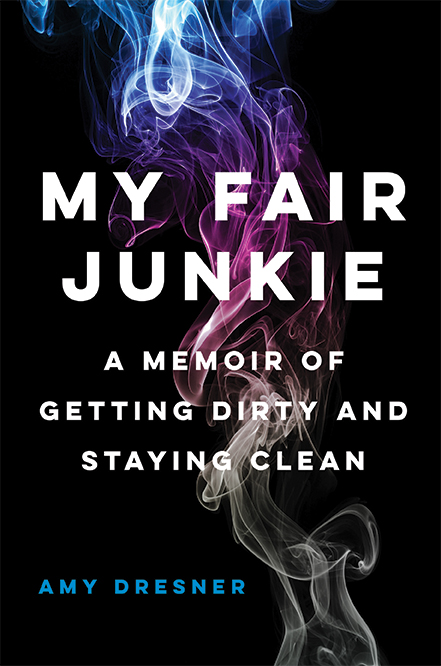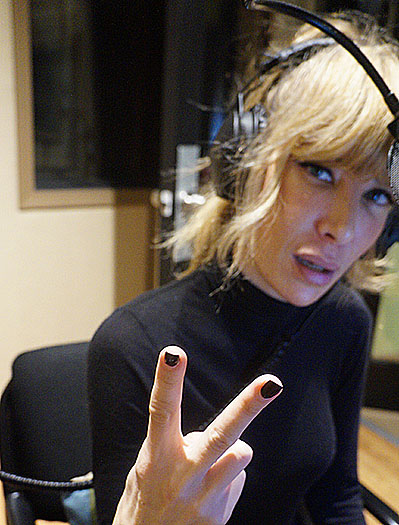Amy Dresner’s ‘My Fair Junkie: A Memoir of Getting Dirty and Staying Clean‘ is the addiction memoir everyone’s talking about.
In My Fair Junkie, Amy recounts the grim places addiction to drugs, alcohol, and sex took her. I snagged some of Amy’s time to ask her what small victories she celebrates today at 5 years sober, how her family feels about the memoir, and more…
Writing About Addiction
Kali: Hi Amy, and thanks so much for agreeing to answer some questions from me and the rest of the Workit World. I stayed up late every night until I finished your book, My Fair Junkie: A Memoir Of Getting Dirty and Staying Clean. I’m going to ask you the first thing I’m sure everyone asks you: how hard was it to write about some the lowest points in your addiction?
Amy: It was very difficult to write about those moments because I wanted to bring the reader into the addict’s mind, no matter how insane it seemed, so I had to put myself back into that active addict headspace. Of course, at the times I write about, none of what I did seemed nuts to me then. It was all necessary, survival and the demonic possession that is addiction. I needed to take breaks because writing about some of those points was so depressing and uncomfortable. So yes, it was painful, but moreover puzzling. I just don’t recognize that person now. I know it was me and I remember it all vividly, but in some way I feel so far removed from that woman, that it was almost like writing about a stranger. But perhaps that’s a protective mechanism on my part, the detachment.
Did you have to warn your family members and friends before the book came out? Or did they already know what to expect?
I’ve been chronicling a lot of my ups and downs on theFix.com over the past 6 years and I was never somebody who kept my using a secret, so yes, they all knew what to expect. Saying that, some friends have chosen not to read the book because they love me too much to hear about my self-destruction in such exquisite detail. I specifically told my father not to read the parts about drug use or sex addiction or my suicide attempts. He lived through all of that stuff once, he doesn’t need to be re-traumatized. My mother is a sober alcoholic and I think identifies more and read the whole thing.
Amy On Sex Addiction
You struggled not only with addiction to substances, but also sex addiction. There’s a real advocacy movement around drug and alcohol addiction, but process addictions (like sex addiction and gambling) are often overlooked. Do you think we need to be talking about them more?
“Sex addiction was more shameful and more painful than any of the drug use.”

I can only speak for myself but the sex addiction was more shameful and more painful than any of the drug use. For me, personally, my sex addiction is part of my general “addictive nature”. I consider it an arm of my alcoholism. It’s just me searching for a new way to check out, another route to dopamine. And I’m not alone in this. Many people when they get sober struggle with compulsive behavior around food, gambling and sex. I definitely think we should be talking about process addictions more. They can also be extremely destructive just in ways that are less blatant and immediate than drug addiction.
What advice do you have for young women struggling with sex addiction?
Check out SLAA and SAA. They really work for a lot of people. I just didn’t connect to those programs. Aside from escape, I was looking for love and validation in my sex addiction and you certainly don’t find that in the beds of strangers! I’d advise them to read about it. Get support. Don’t beat yourself up. And know that you can come out the other end. It’s not a life sentence. There are some doctors now saying sex addiction doesn’t really exist but I will tell you it felt pretty real and compulsive to me but hey, I’m not a doctor.
Talking 12-step Programs
In the book, 12-step programs seemed as harmful to you as they did helpful. What is your relation to 12-step today? What would you tell people considering 12-step?
I disagree with that and I apologize if it came off that way. I was very angry when I first got into the program and I was bothered by the fundamentalism and the remnants of the program’s Christian roots in some of the language and prayers. I think 12 step is great. The tools are gleaned from many religions and psychologies and are very effective. I took issue in my book with the fellowship which can get very complicated (with power hierarchies and sexual predatory behavior) when you take a bunch of sick broken alcoholics and put them in a room together.
I’m in a 12 step program now. I’m in AA. I don’t adhere to the 11th tradition. I think it’s outdated and actually does more harm than good by keeping the program shrouded in secrecy and perpetuating the mythology that it’s some cult. I have a sponsor, sponsees and I secretary a meeting. The steps worked better than any therapy I’ve ever been in and I’ve been in them all. AA is really like free group Cognitive Behavioral Therapy if you remove the spiritual element. The program saved my life and made me into a person that I actually like and am proud to be.
To people considering it, I’d say check it out. There are a lot of different types of meetings. See if one feels right for you. Keep an open mind. Some people go to their first 12 step meeting and are like “Ahh I’m home”. Others find it a little creepy at first. If it doesn’t feel like a fit after you’ve checked out a few meetings, there are other programs like Smart Recovery or Refuge Recovery. And of course, if you’re not open to being completely abstinent, there are harm reduction therapies/programs.
The Gifts of Recovery
You just celebrated 5 years. Congratulations! What has been the most surprising thing about recovery for you?
I would have to say that things that I was convinced were “just me,” characteristics I was sure I’d be stuck with forever, have fallen away. And also I’ve been able to accomplish things I only dreamt of before: writing a book, being a good employee, being a good friend or partner.
How important was it for you to separate yourself from the “hot mess” identity you created for yourself when drinking and using? In addiction, we can begin to identify with these stereotypes (hot party girl, mom who drinks to relax, chill stoner guy) that society seems to perpetuate. Was it difficult to find yourself away from drugs, alcohol, and sex?

“People took care of me and tried to fix me…. until they didn’t anymore.”
Not really. I’ve had periods of long-term sobriety before but still always considered myself broken on some level. I think the key problem is that I was getting perks by being this broken person who couldn’t get it together. And by that I mean I was freed of any responsibility for myself and my life. People took care of me and tried to fix me…. until they didn’t anymore. But this time around I dropped that “I’m broken” story.
I agree that those “labels” can be excuses and self-fulfilling prophecies and I used them for a long time to explain away my behavior. “What do you expect? I’m a…..” Saying that, being clean and successful still feels new and unfamiliar as I was such a fuck up for so many years. That “hot mess” identity is part of my past and I have to honor that. That’s the part of me that people who are still struggling with addiction can identify with. But not being that person does take some adjusting. Even when you change dramatically, after 20 years of a lifestyle or behavior, you’re always waiting for the other shoe to drop.
Your book is called My Fair Junkie: A Memoir of Getting Dirty and Staying Clean. There’s a big push in the medical field to move away from phrases like ‘clean’ and ‘junkie,’ but you refer to yourself as a junkie in the book. What does the term mean to you?
Well I don’t think “My Fair Girl with Substance Use Disorder” would have sold very many books! The book is not PC and neither am I. That’s why most people love it and some find it sort of brash or offensive. The book is VERY raw and I never had any shame or denial about being a drug addict. I think at some points I even had a weird reverse pride about it. We addicts have a tendency to glamorize the darkness. To me, a junkie is a “fiend” and I was a fiend… for everything. And also the “clean” in the subtitle doesn’t just relate to being clean from drugs but clean after washing all the street soot off you after community labor.
You have to understand that although I support recovery, I’m not an official “recovery advocate” per se. I’m not trying to start a movement. I’m just a recovering addict and a writer. I appreciate changing the vernacular to reduce stigma but I think that’s going to take a very long time. I was a junkie. Why not own it? I’m not into candy-coating anything. That’s not my style. I mean has using the term “African American” really reduced racism or just put a PC veil on it? I think we change people’s thinking by showing the plethora of different people with addiction and coming out of the closet with our recovery. In meetings people say “I have 5 days clean” so I was just using the real vocabulary of the addiction/recovery world. Also I come from a comedy background where you use the most funny, shocking and effective words. Same with editorial writing. There’s a saying, “If it bleeds, it leads.” My book wasn’t meant to be a recovery manual. It is just a gruesomely honest addiction memoir and from the feedback I’m getting, that’s why it’s helping people. Because I don’t tip toe around things or get preachy, precious or self-pitying.
In the Workit program, we celebrate Workit wins. These are small victories that may not seem like a big deal to the outside world, but keep you on the right track. What Workit wins have you had recently?
I started meditating again regularly and it’s made a huge difference in my happiness and mood stability. I’ve been better about keeping my house clean. I finally took care of my taxes. I make sure that I thank people and show my appreciation.
“Creativity is key. And I don’t abandon myself anymore or expect other people to fix me.”

Sobriety is a hell of a lot better than drug addiction, but it’s no cake walk. Being sober means navigating through life’s tough stuff with tools that work better than drugs or alcohol. What tools are vital to your recovery today?
The usual stuff. I work a program: meetings, steps, etc. I stay connected and close to my support group. I do breathwork. I make sure I’m of service in and out of the rooms. I don’t run away from my feelings, no matter how uncomfortable they are and I try not to let them dictate my actions. I say “no” and enforce my boundaries. I try to stay grateful and keep things in perspective. Much of that is staying in the present and knowing that everything, good and bad, passes. But most of all I stay busy and creative. Creativity is key. And I don’t abandon myself anymore or expect other people to fix me. I’m able and resilient. I know that now.
My Fair Junkie is available now! Buy it on Amazon or at your local bookstore. Find Amy on Twitter and Instagram @AmyDresner or visit her website at www.amydresner.com.









